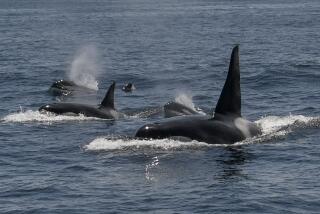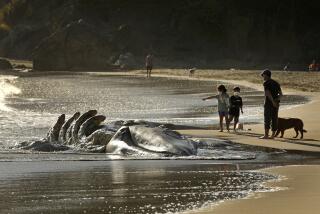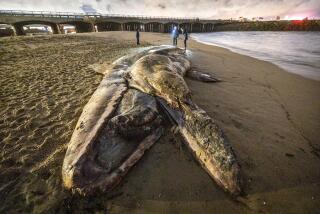Panel delays action on killer-whale show ban, says more study needed
An Assembly committee Tuesday called for additional research on a bill that would end killer whale shows at SeaWorld San Diego.
Assemblyman Anthony Rendon (D-Lakewood), chairman of the Parks, Water and Wildlife Committee, said the issue of killer whales in captivity is too complex to be decided after a hearing of less than two hours.
The panel’s action, called sending a bill to “interim study,” triggers a process that will last until at least mid-2015, Rendon said. The action did not require a vote.
Naomi Rose, marine mammal scientist at the Animal Welfare Institute, one of the bill’s backers, said she was disappointed by the committee’s move but pleased that discussion about killer whales will continue.
SeaWorld officials had told the committee that the bill would cripple the park’s program of rescuing injured animals in the wild. Also, SeaWorld officials suggested that SeaWorld would ship its killer whales out of California before the bill became effective.
AB 2140, authored by Assemblyman Richard Bloom (D-Santa Monica), would prohibit orcas from being used for “performance or entertainment purposes” and require SeaWorld to return the orcas to the wild “where possible.” If that is deemed impossible, the orcas must be “transferred to a sea pen.”
Bloom said that his bill was “a work in progress” and that he welcomed the opportunity for “additional dialogue.”
Among the topics to be studied would be whether orcas in captivity live as long as orcas in the wild, whether it is practical to build sea pens, and whether the orcas are suffering, as the AB 2140 backers insist, or thriving, as SeaWorld insists.
SeaWorld San Diego has 10 orcas: four caught in the wild, six born in captivity. The Bloom bill would also prohibit the captive breeding of orcas.
The bill was sparked by the advocacy film “Blackfish,” shown in theaters and on CNN. The film asserts that the orcas are mistreated in captivity by being kept in close confinement and notes the death of a SeaWorld employee in Florida in 2010, killed by an orca.
Both sides in the dispute have launched lobbying campaigns. SeaWorld officials went to Sacramento last week to argue that the bill is unneeded and that “Blackfish” is inaccurate.
On Monday, advocates from the Animal Welfare Institute arrived in Sacramento with a petition they said was signed by 1.2 million people in support of the bill.
Opposition to the bill from San Diego’s tourism industry is based on the economic threat to SeaWorld if orca shows are banned. Although the park has many other attractions, the orca shows at Shamu Stadium have long been the marquee.
SeaWorld San Diego, which drew 4.6 million visitors last year, employs 4,500 workers during the peak tourism season and is a major driver to the region’s tourism economy.
tony.perry@latimes.com
Twitter: @LATsandiego
More to Read
Start your day right
Sign up for Essential California for news, features and recommendations from the L.A. Times and beyond in your inbox six days a week.
You may occasionally receive promotional content from the Los Angeles Times.






